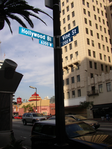The Checkers speech or Fund speech was an address made on September 23, 1952, by California Senator Richard Nixon, six weeks before the 1952 United States presidential election, in which he was
the Republican candidate for Vice President. Nixon had been accused of improprieties relating to a fund established by his backers to reimburse him for his political expenses. His place was in doubt on the Republican ticket, so he flew to Los Angeles and delivered a half-hour television address in which he defended himself, attacked his opponents, and urged the audience to contact the Republican National Committee (RNC) to tell it whether he should remain on the ticket. During the speech, he stated that he intended to keep one gift, regardless of the outcome: a black-and-white Cocker Spaniel that his children had named Checkers, thus giving the address its popular name.
Nixon came from a family of modest means, as he related in the address, and he had spent his time after law school in the military, campaigning for office, and serving in Congress. After his successful 1950 Senate campaign, his backers continued to raise money to finance his political activities. These contributions went to reimburse him for travel costs, postage for political mailings which he did not have franked, and similar expenses. Such a fund was not illegal at the time, but Nixon had made a point of attacking government corruption which exposed him to charges that he might be giving special favors to the contributors.
The press became aware of the fund in September 1952, two months after Nixon's selection as General Dwight D. Eisenhower's running mate, and the story quickly grew until it threatened his place on the ticket. In an attempt to turn the tide of public opinion, Nixon broke off a whistle-stop tour of the West Coast to fly to Los Angeles and make a television and radio broadcast to the nation; the RNC raised the $75,000 to buy the television time. The idea for the Checkers reference came from Franklin D. Roosevelt's Fala speech, given eight years to the day before Nixon's address, in which Roosevelt mocked Republican claims that he had sent a destroyer to fetch his dog Fala, when the dog was supposedly left behind in the Aleutian Islands.
Nixon's speech was seen and heard by about 60 million Americans, including the largest television audience to that time, and it led to an outpouring of public support. The RNC and other political offices received millions of telegrams and phone calls supporting Nixon. He was retained on the ticket, which swept to victory weeks later in November 1952. The Checkers speech was an early example of a politician using television to appeal directly to the electorate, but it has sometimes been mocked or denigrated. The term Checkers speech has come more generally to mean any emotional speech by a politician.








